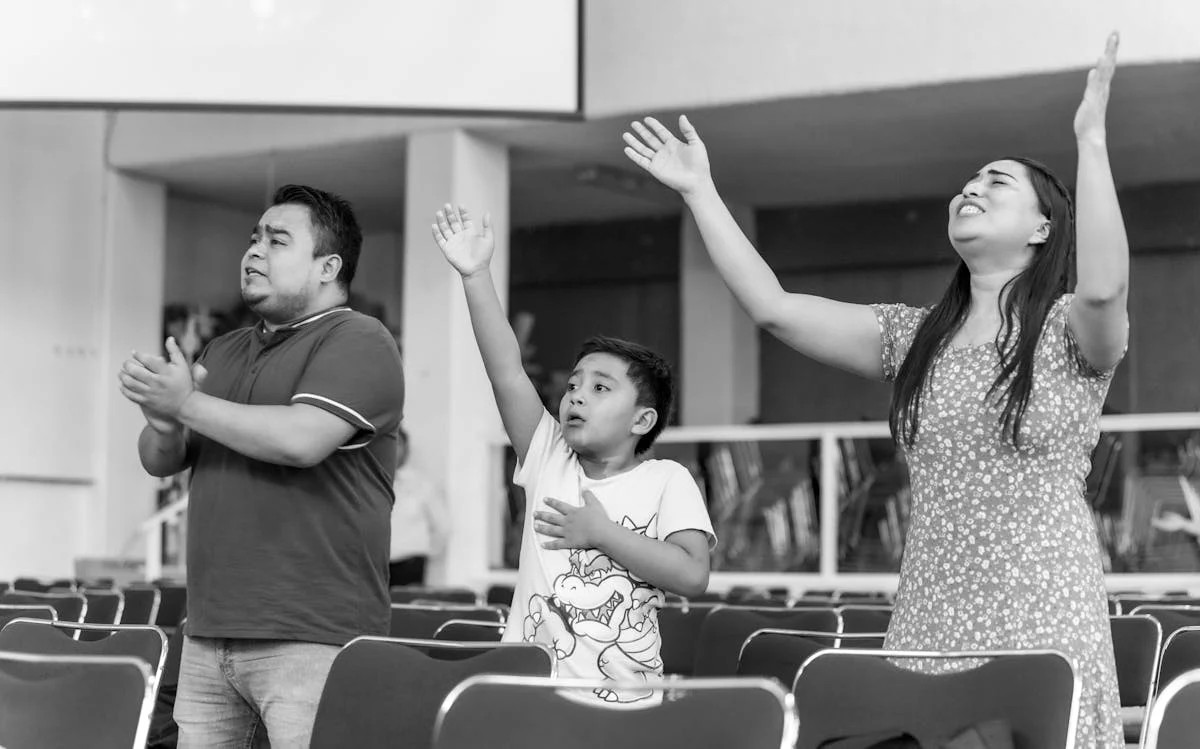“Discovering Lasting Peace Through Jesus’ Teachings and Example”
Finding peace in today’s fast-paced world can feel like an impossible task. Between juggling work, family, and personal stress, we often feel like we’re running on empty. Yet, Jesus offers us a timeless blueprint for inner peace, one that doesn’t rely on changing our circumstances but transforming our hearts. By following His example and embracing His teachings, we can find a deeper sense of peace that lasts. Let’s explore how we can apply Jesus’ blueprint for peace in our everyday lives.
1. Trust God’s Plan, Even When You Don’t Understand
Have you ever found yourself caught up in worry about the future? It’s easy to get lost in the “what ifs” and wonder how things will work out. But Jesus made it clear that true peace comes when we trust God’s plan, even when we can’t see the full picture. In John 14:1, He says, “Do not let your hearts be troubled. Trust in God; trust also in me.” This wasn’t just a nice saying—it was a deep invitation to rest in the knowledge that God is in control.
When life doesn’t go as planned, we often feel anxious or defeated. But trust isn’t about understanding every twist and turn—it’s about believing that God is with us through it all. Just as Jesus trusted His Father through moments of uncertainty, we can trust that God will guide us through the unknown. Even when we don’t have the answers, we can have peace knowing that God’s got our back.
2. Find Rest in God’s Presence
In a world where everyone seems to be on the go, Jesus invites us to slow down and rest. How many of us have felt like we’re constantly running on empty, with no time to recharge? Jesus understood the importance of rest, not just physically, but emotionally and spiritually. In Matthew 11:28-30, He offers a beautiful invitation: “Come to me, all you who are weary and burdened, and I will give you rest.”
This rest isn’t about taking a nap (though that can help too!). It’s about finding stillness in God’s presence. Jesus often withdrew from the crowds to pray, recharge, and reconnect with His Father. We too can find peace by carving out moments in our day to be alone with God, whether that’s through prayer, meditation, or simply being still. When we rest in His presence, we allow our minds to settle and our hearts to be renewed.
3. Let Go of Worry and Live in the Moment
Worrying about the future can steal our peace in the present. Jesus knew this and taught His followers to focus on today, rather than stressing about tomorrow. In Matthew 6:34, He says, “Do not worry about tomorrow, for tomorrow will worry about itself.” This doesn’t mean we shouldn’t plan or prepare, but it encourages us not to let our minds spiral into anxiety about what’s yet to come.
Living in the moment doesn’t mean ignoring our responsibilities. Instead, it means fully embracing the present without letting future worries steal our joy. When we choose to live in the moment, we shift our focus from what could go wrong to what is happening right now. Whether it’s enjoying a peaceful moment with a cup of coffee or spending time with loved ones, there’s peace in being present.
Jesus modeled this by not allowing the pressures of His mission to rob Him of His peace. He focused on the people He was with, the work He was doing, and the present moment. When we follow His lead, we can experience peace in our daily lives.
4. Love Others, Even When It’s Hard

Loving others can be challenging, especially when they don’t always treat us the way we want to be treated. But Jesus teaches that love is key to experiencing true peace. He said the greatest commandments are to love God and love others (Matthew 22:37-39). This love isn’t based on feelings; it’s a choice we make, even when it’s difficult.
When we choose to love, especially in moments of hurt or frustration, we release bitterness and open ourselves up to peace. Holding onto anger or resentment only weighs us down. Jesus demonstrated this love in the most extreme way—by forgiving those who hurt Him on the cross. His example shows us that peace comes when we choose love over conflict, even when it’s hard.
Loving others also helps us to be more compassionate, understanding, and patient, which leads to a more peaceful heart. Whether it’s forgiving someone who’s wronged us or choosing kindness in a difficult situation, love paves the way for inner peace.
5. Embrace the Peace Jesus Offers
At the heart of Jesus’ blueprint for peace is the peace He offers us. In John 14:27, He says, “Peace I leave with you; my peace I give you. I do not give to you as the world gives.” The peace Jesus offers isn’t fleeting or based on circumstances. It’s a deep, lasting peace that comes from knowing we are loved by God and that He is always with us.
This peace isn’t something we have to earn or strive for. It’s a gift, freely given to those who choose to trust in Jesus. When life gets tough, we can turn to Him and embrace the peace He offers. It’s a peace that doesn’t depend on what’s happening around us, but on our relationship with God. When we rest in His love and trust in His plan, we experience peace that the world can’t take away.
Lessons from the Sermon on the Mount
The Sermon on the Mount is one of the most powerful teachings Jesus ever gave, and guess what? It was spoken to ordinary people just like you and me. No fancy titles or perfect lives required. Jesus sat on a hill and shared truths that still change hearts today. Let’s take a walk through it together, in a way that makes sense to your everyday life.
1. Blessed Are You—Yes, You!
When Jesus started with “Blessed are the poor in spirit,” He turned the world’s ideas upside down. Normally, we think blessings come with money, success, or popularity. But Jesus said, “Hey, even when you feel empty inside, you’re blessed because God’s kingdom is for you.” You don’t need it all together to be loved by God. In fact, those moments when you’re weak and honest are when His strength shows up the most.
He also said, “Blessed are those who mourn.” That means it’s okay to cry, to hurt, and to feel pain. Jesus doesn’t ignore your tears—He promises comfort. Maybe you’ve felt overlooked or walked through grief alone. But this lesson reminds you that God sees every tear and is near to the brokenhearted.
2. Be Salt, Be Light—Just Be You with Jesus
One of the coolest parts of the Sermon is when Jesus called us the salt of the earth and the light of the world. Think about it—salt adds flavor, and light helps people see. You don’t have to be loud or famous to shine. Just by being kind, honest, and loving, you bring God’s flavor and brightness into places that really need it.
Being “salt” means your life adds value to others. It could be a smile, a prayer, or helping someone who’s struggling. Being “light” means letting your actions reflect God’s goodness, so others can see hope through you. It doesn’t mean being perfect, but being real—and letting Jesus shine through your ordinary moments.
3. Love Your Enemies? Wait, What?
This one is tough, let’s be real. Jesus said to love your enemies and pray for those who hurt you. That’s not easy, especially when someone has been unfair or mean. But here’s the thing—when you choose love over hate, you free your heart. Forgiveness doesn’t mean forgetting or excusing bad behavior. It means refusing to let bitterness take control of you.
When Jesus taught this, He wasn’t being soft. He was being strong. It takes strength to love someone who doesn’t love you back. But when you do, you’re showing the kind of love God gives every day. You’re choosing peace over payback, and in that moment, you grow stronger than your hurt.
Extra Lesson: Worry Less, Trust More
Let’s face it—we all worry. About bills, health, family, the future… it’s part of life. But Jesus said, “Don’t worry about tomorrow.” He reminded us that birds don’t stress about food, yet God feeds them. Flowers don’t work or shop, yet they’re beautifully dressed. If God cares that much for birds and flowers, how much more does He care for you?
This lesson isn’t about pretending problems don’t exist. It’s about learning to breathe, trust, and take one step at a time. You’re not alone, and you don’t have to carry everything on your shoulders. God’s got you, even when life feels out of control.
How Christ Responded to Pressure
Let’s be honest—life brings pressure from every direction. Work, family, finances, expectations… it can feel like too much sometimes. But did you know that even Jesus faced pressure? Yes, the Son of God wasn’t walking around stress-free in a calm bubble. He felt what you feel—only more. The beautiful thing is how He handled it. Let’s look at some powerful moments and discover how Christ responded to pressure in ways that can inspire and help you today.
1. When Expectations Were High, He Stayed Grounded
Everywhere Jesus went, crowds followed Him. People expected miracles, healing, answers, and sometimes even political action. Talk about pressure! Imagine trying to help thousands of people while knowing some are there just to criticize you. That’s real tension. But Jesus didn’t panic or try to please everyone. Instead, He stayed true to His purpose.
You know those moments when people expect too much from you? Jesus understands that. He didn’t let the noise around Him distract from what He was called to do. When pressure piled up, He chose peace over people-pleasing. That’s a great lesson—you don’t have to say yes to everything or meet every demand. Your purpose matters more than public opinion.
2. When the Crowds Got Loud, He Got Quiet
This one might surprise you. When the pressure rose, Jesus often stepped away. Not to run—but to pray. He didn’t just keep pushing forward. He paused. You can find several moments in Scripture where He slipped away to be alone with God. That’s where He found clarity, strength, and rest.
You don’t need a perfect mountain view to do the same. You just need a few quiet moments to breathe, pray, and recharge. If Jesus—who had all the power in the world—needed time with the Father, how much more do you? The next time pressure knocks, try stepping away for a moment. That quiet space might hold the answers your busy brain can’t find.
3. When He Was Misunderstood, He Responded with Grace

Some people tried to trap Jesus with tricky questions. Others doubted Him, rejected Him, or flat-out accused Him of lies. Instead of snapping or arguing, Jesus answered with wisdom, calm, and grace. He didn’t always explain Himself. He didn’t fight to be understood. He simply stood in truth and kept walking in love.
When people don’t get you, it’s tempting to defend yourself or fight back. But Jesus teaches us a different way. Sometimes grace is louder than your words. You don’t have to explain your every move. Keep living in truth, and let God handle the rest.
4. When Fear and Pain Hit, He Was Honest
In the Garden of Gethsemane, Jesus was under intense emotional and spiritual pressure. He knew the cross was coming. The pain, the betrayal, the weight of the world’s sin—it was all crashing down. What did He do? He talked to God, openly and honestly. “Father, if it’s possible, take this cup from me.” Those words show that Jesus wasn’t pretending to be fine. He was real. He felt it all.
But He didn’t stop there. He surrendered, saying, “Not my will, but Yours be done.” That moment of surrender is one of the most powerful responses to pressure in history. You can cry out to God when life hurts. You don’t have to be strong all the time. What matters is trusting Him enough to say, “Lord, I’m scared—but I’m still Yours.”
5. When He Was on the Cross, He Thought of Others
Imagine the pressure of hanging on a cross—physically, emotionally, spiritually crushed. Even then, Jesus thought of others. He forgave those who hurt Him. He comforted a criminal beside Him. He cared for His mother. That kind of love under pressure is incredible. It shows you that even in your hardest moments, love can still lead the way.
You don’t need to have it all together to be a blessing. Even when you’re tired, stressed, or overwhelmed, you can show kindness, speak hope, or forgive. That’s not weakness—it’s strength like Christ.
Learning Silence in the Storm
We’ve all been there—caught in storms we didn’t see coming. Life gets loud. People talk. Emotions rise. And suddenly, everything feels like too much. But did you know silence is sometimes the most powerful response? Learning to be silent in the storm is not weakness—it’s strength, wisdom, and trust wrapped in peace. Let’s walk through what it means to embrace silence when life rages loud around you.
1. Storms Will Come, But You Don’t Have to Shout Back
You’ve probably faced moments when problems pile up, and everyone has something to say. Friends mean well, family gives opinions, your own mind races with fear. It’s natural to want answers, fixes, and explanations. But look at Jesus in the boat during the storm—He slept. The disciples panicked. The waves raged. Yet Jesus rested in silence until the right moment came.
When your storm hits, your first reaction might be panic. But what if you chose quiet instead? Not silence from fear—but silence from trust. It’s okay not to have all the answers right away. Sometimes, the strongest move is staying calm and letting God speak before you do.
2. Silence Gives God Room to Speak
You might think silence is doing nothing, but it’s actually doing something powerful. When you stop talking, worrying, or reacting, you create space. That space is where God can whisper peace to your heart. It’s where clarity rises, and anxiety begins to lower its voice.
In storms, we tend to pray loud, cry hard, and try everything. That’s okay—God hears all of it. But there’s something special about stillness. You’re saying, “God, I trust You more than my fear.” It’s like letting Him take the steering wheel while you close your eyes and breathe. You don’t have to figure it all out. Your job is to trust the One who can.
3. Jesus Didn’t Panic, and You Don’t Have To Either
Picture Jesus during the storm again. The boat rocked. The water splashed. Everyone else shouted, but He remained quiet until the right time. He didn’t let the storm decide His reaction. He responded from peace, not panic. That’s a powerful lesson for you.
You don’t have to react just because things feel out of control. Not every situation needs a big response. Sometimes silence speaks louder than your words ever could. It shows maturity, faith, and confidence. Even when people expect you to explode or explain, silence can be your boldest choice.
4. Silence Protects Your Peace

People might misunderstand your quiet moments, and that’s okay. They may think you’re ignoring the issue or avoiding the problem. But silence doesn’t mean you don’t care—it means you’re protecting your peace. Your peace is precious. When you stay silent in the storm, you’re saying, “I won’t let chaos decide my mood.”
Peace isn’t always about changing the situation. Sometimes it’s about changing your reaction to the situation. You have control over your response, even if you don’t have control over the storm itself.
5. Some Answers Come in the Stillness
You might be waiting on God for answers. Maybe you’ve prayed, cried, and asked everyone around you what to do. But maybe—just maybe—the answer is waiting in your silence. God isn’t in the noise. He often shows up in whispers, dreams, gentle nudges. And you can only notice those when your heart gets quiet.
Learning silence means trusting that you don’t need to fill every silence with sound. The world teaches you to hustle and stress. But God teaches you to be still and know He is God. That stillness is where wisdom grows.
6. Your Silence Can Be a Testimony
People watch how you handle storms. Your calmness can be a message in itself. While others rage and panic, your quiet trust stands out. You’re saying without words, “I know Who holds this storm.” That kind of faith encourages others more than you realize.
You don’t need to post every detail or explain every pain. Your silence in chaos might be what helps someone else find peace in their own storm. It’s not about hiding your feelings—it’s about surrendering them to God.
What Jesus Meant by “My Peace I Give You”

If there’s one thing we all need in today’s world, it’s peace. Not just a moment of quiet—but real peace, the kind that settles your soul even when everything around you is loud and messy. That’s exactly what Jesus was talking about when He said, “Peace I leave with you; my peace I give you” (John 14:27). But what does that actually mean for you? Let’s break it down in a way that makes sense and feels good to read.
1. Not Just Any Peace—His Peace
When Jesus said “My peace I give you,” He wasn’t offering a temporary break from problems. He wasn’t promising a vacation from stress or a life without challenges. He was talking about something deeper—a calmness that sits inside your heart even when storms are raging outside.
Jesus had the kind of peace that let Him sleep during a storm, stay calm when others accused Him, and forgive those who hurt Him. That’s the peace He’s giving you. It’s strong, steady, and unshakable. It’s not based on how well things are going—it’s based on who God is. You don’t earn it, and you don’t have to work for it. You just receive it by trusting Him.
2. The World’s Peace vs. Jesus’ Peace
Jesus made it clear—“I do not give to you as the world gives.” The world’s version of peace depends on circumstances. It says, “You’ll feel okay if everything goes okay.” But the peace Jesus offers says, “You’ll feel okay because I’m with you, no matter what.”
Think about it like this—the world offers peace like a fragile vase. One bump, and it shatters. But Jesus offers peace like a rock. No matter what hits it, it stays firm. You can carry His peace through hospital visits, financial stress, family arguments, and every uncertain season. It doesn’t vanish when life gets hard—it shows up stronger.
3. Peace Is Not the Absence of Trouble
One of the biggest misconceptions is thinking peace means zero problems. But Jesus never promised that. In fact, He said you’d have trouble in this world—but then He said, “Take heart, I have overcome the world.” That’s His peace in action. You get to walk through problems without being overwhelmed by them.
You might still feel nervous, sad, or confused at times. Peace doesn’t mean you stop feeling—it means your heart doesn’t stay stuck in fear. It’s like walking through a storm with an umbrella. The rain may come, but it won’t soak you. You’re covered by the peace of God.
4. How to Receive His Peace Daily
Jesus already gave you His peace, but sometimes you forget to unwrap the gift. Life throws so much at you that it’s easy to slip into worry or stress. That’s why you need to make room for His peace every day.
Start your mornings with prayer, even just for five minutes. Whisper, “Jesus, I receive your peace today.” Read a verse or listen to worship music. When anxiety creeps in, pause and breathe. Speak truth over your mind. Remind yourself that you’re not alone, and that God is in control.
And here’s a fun tip: even laughing more helps. Joy is one of the fruits of the Spirit, and it makes space for peace to grow.
5. Letting Go So Peace Can Flow
Sometimes your heart has no room for peace because it’s full of worry, regret, or frustration. Jesus wants you to hand those over. You weren’t created to carry every burden. That’s why He said, “Come to me, all who are weary.”
Letting go doesn’t mean ignoring your problems. It means releasing control and trusting that God knows what to do with them. As you release, peace begins to settle in. It’s like cleaning out a messy closet—when you make space, the good stuff can fit.
Final Thoughts: His Peace is Your Superpower
In a world full of chaos, Jesus offers something you can’t buy, fake, or lose—His peace. It’s your quiet strength, your calm in the chaos, and your reminder that no matter what happens, He’s got you.
You won’t always feel peaceful, but you can always choose peace. The more you trust Jesus, the more His peace takes root in your heart. It’s a gift, a promise, and a powerful truth that changes how you face life.
So the next time life feels heavy, remember what He said: “My peace I give you.” And believe it—it’s yours to keep.




